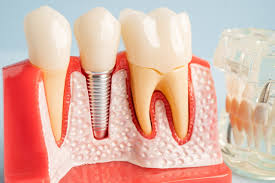Dental implants do more than replace missing teeth; they also play a key role in preserving jawbone health. When a tooth is lost, the surrounding bone can gradually weaken due to a lack of stimulation. Dental implants act like natural tooth roots, providing the necessary support to keep the bone strong and stable. Here’s more information on how implants prevent bone loss in the jaw:
Bone Loss Explained
The jawbone requires constant stimulation to maintain its density and structure. Natural teeth provide this stimulation through daily activities like chewing and biting. When a tooth is lost, the bone in that area no longer receives this fundamental stimulation.
Traditional tooth replacement methods like dentures and bridges do not address bone loss. Dentures rest on top of the gums and provide minimal stimulation to the underlying bone. Bridges rely on adjacent teeth for support and do not replace the missing tooth root.
Implant Function
Dental implants are titanium posts surgically placed into the jawbone to replace missing tooth roots. The implant integrates with the surrounding bone tissue through a process called osseointegration. This integration creates a strong foundation that mimics the function of a natural tooth root.
The titanium material is biocompatible, meaning the body accepts it without rejection. Over several months, bone cells grow around and bond to the implant surface. This creates a permanent connection between the implant and the jawbone.
Once osseointegration is complete, the implant can support the forces of chewing and biting. These forces are transmitted through the implant directly to the jawbone, providing the stimulation needed to maintain bone density. The stimulation occurs with each bite, chew, and jaw movement throughout the day.
Jaw Health Benefits
Implant dentistry offers significant advantages for preserving jawbone structure over time. Preserving the jawbone structure maintains the natural contours of your face and jaw. Maintaining bone density also helps preserve the fit and function of your bite. When bone loss occurs, the alignment of your teeth can shift, leading to problems with chewing and speaking. Tooth implants help maintain proper jaw alignment and prevent these complications.
The bone preservation benefits of dental implants also support long-term oral health. A stable jawbone provides better support for adjacent teeth and helps maintain proper spacing between teeth. This stability reduces the risk of further tooth loss and supports overall dental health.
Oral Health Benefits
While bone preservation is a key benefit, dental implants offer other advantages for oral health and function. Implants provide better stability, allowing you to eat a full range of foods without concern. The natural appearance and feel of implants can restore confidence in your smile.
Implants do not require removal for cleaning or maintenance. They are cleaned and maintained just like natural teeth through regular brushing and flossing. Dental implants also protect adjacent teeth from damage. Implants stand alone and do not affect surrounding teeth, preserving more of your natural tooth structure.
Consult a Dental Implants Specialist
Implants are one of the most effective tooth replacement options for preventing jawbone loss. By mimicking natural tooth roots, tooth implants provide the stimulation needed to maintain bone density and preserve facial structure. For one or more missing teeth, schedule a consultation with a qualified implant dentistry specialist today. They can evaluate your specific situation and determine if you are a candidate for dental implants.


Leave a Reply